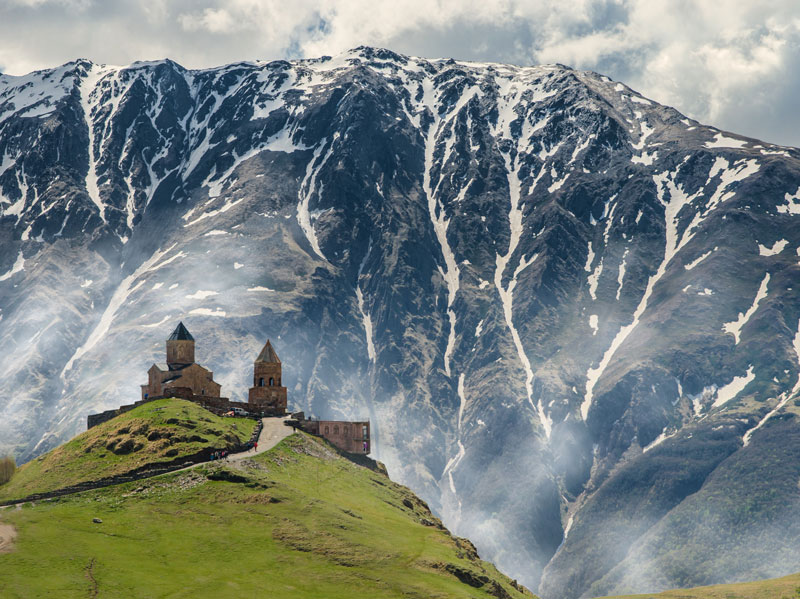Why visit Georgia? By Ian Colvin
posted on 26/07/23
As I sit here in West Georgia, three weeks into our annual archaeological excavation season, with Europe’s news-cycle a remote and less-distracting hum, I am tempted to extol the pleasant climate, the absence of crowds, the unique cuisine, fine wines, and warm hospitality. Georgians are excellent company, open-hearted and open-handed, and I am surrounded by strong friendships and shared intellectual inquiry. I am privileged to be returning in September, when Martin Randall Travel's Georgia Uncovered tour provides similar cerebral companionship.
Landscape, culture, and history are at the heart of a good trip and Georgia has them all. It is a country of dramatic geographic contrasts. Europe’s highest mountains tower over fertile lowland plains. The lush subtropical forests and wetlands of Colchis, in the west, give way to the rich agricultural lands of Kartli and Kakheti, and then to the semi-deserts of the border country by Azerbaijan. Twice annually, shepherds on horseback drive the flocks and herds to and from rich mountain pastures in a rhythm as old as the Neolithic.
These same ancient pastoral and trade routes will carry us over the watershed between Black and Caspian seas; up to the ancient ’Gates’ that Alexander of Macedon set in the Darial pass to seal it against Scythian raiders from the Eurasian steppe; and over to Georgia’s rich wine-country, Kakheti. On the Black Sea coast since antiquity, merchants from Iran and Central Asia met Greeks and Italians to trade silk, spices, slaves, skins and other goods. In the last 150 years Baku oil became the newest global commodity traded there as Europe’s merchant dynasties vied to bring it to world markets.
These interchanges with neighbouring cultures greatly enriched Georgia’s built and intangible cultural heritage. Georgians are Orthodox Christians, and Europeans since the 18th and 19th centuries. They are among the most pro-Western in the post-Soviet space; yet long contact with Armenia and the Holy Land, the Arabian Caliphate, Turkey, and Iran joins them to the Near East, perhaps most evocatively in their customary warm hospitality.
And while the Georgian supra, the feasting table, with its warm traditions of toasting and eloquence, is reminiscent in some ways of the Greek symposium, Georgians will tell you that it is far older. Archaeological finds demonstrate the first domestication of the wild grape vine took place in this part of the world 7,000 or 8,000 years ago – and Georgians’ continued use of the ancient method of fermenting wine in huge buried clay pots has captured the palates of oenophiles around the world.
The history and culture of the country, ancient and modern, seized my attention some thirty years ago. The language, with its three beautiful, calligraphic and still-used alphabets, provides a brain-ticklingly complex challenge as I sought to get to grips with the Georgian sources. Friends, both Georgian and fellow kartvelophile Westerners, introduced me to Georgia’s magnificent polyphonic folk tradition, its award-winning films, its architecture and its literature.
September is a favourite time to visit, promising pleasant temperatures, sites less busy, with domestic tourists now back at school and work, and with tables still well stocked with summer fruits and vegetables, and with the vintage ripening in Kakheti. With Covid lockdowns a distant memory, and southern Europe suffering under heat-domes, Georgia offers a unique opportunity to examine Europe, the Black Sea and the Near East through the prism of a small country that has been surprisingly prominent in many of the great events and currents of history. Come explore them with me.
With best wishes,
Ian Colvin
Nokalakevi, Samegrelo, Georgia
'Ian Colvin – marvellous! Friendly, easy to listen to, relaxed manner. Made me feel completely included, despite my total lack of knowledge!'
'Everything slotted into place, as if by (carefully worked out) magic. Ian's enthusiasm for the history of Georgia was hugely infectious.'
